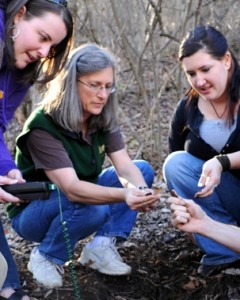Climate change. Natural disaster. Floods and droughts…
Our planet is changing and our world leaders and businesses are trying to prevent a disaster. To do this, we need people with environmental science backgrounds.
When Laura DeWald, Ph.D., became the director of WCU’s environmental science program in fall 2004, the program had no students or recruiting materials. Today, the program averages about 80 students at a time.
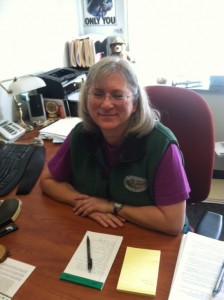
Laura DeWald, Ph.D., is the director of the environmental science program and the only faculty member dedicated primarily to the program. Photo by Haley Smith.
Although the environmental science program has seven interdisciplinary faculty members who contribute to the program, DeWald is the only faculty member specializing in environmental science.
“The environmental science faculty lacks identity,” said DeWald. “Fortunately a lot of people like the environmental science program and are willing to take time out of their day to do service for it.”
According to DeWald, the program’s lack of ‘environmental science’ specific courses limits its ability to argue for more faculty members.
DeWald says that the interdisciplinary aspect of WCU’s environmental science program is what makes it so unique.
“If you look at [environmental science or similar programs] at most of the other schools within the UNC system, they claim that they’re interdisciplinary, but most of the programs are specific to biology and geology or biology and chemistry. [The environmental science program] at WCU is spread out across biological, physical and social sciences,” said DeWald.
Out of the 16 UNC system university campuses, WCU is one of only three that offer an environmental science degree program. This statistic is the reason so many potential environmental science students are applying to WCU.
“I considered a few other schools that had environmental programs, but none of them were truly a program about environmental science – except for WCU. Most of them were natural resource management related,” said Josh Turnbull, a senior environmental science student.
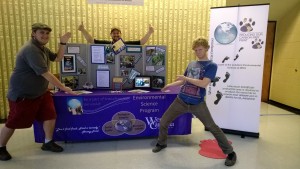
From left to right: Sam McClung, Matt Nethercutt, Jonathan Sawyer. Environmental science student ambassadors promote the program at WCU open house. Photo by Laura DeWald.
Another unique thing about the environmental science program at WCU is its flexible curriculum. Students are able to create their own curriculum to put them in the best position possible to achieve their goals after graduation.
“We have students look for their dream job and then work their way backwards,” said DeWald. She explained that sometimes students “get stressed” because there isn’t a set list of courses for them to take, but it’s deliberate planning for their future.
“I want students to do what makes their hearts sing,” said DeWald. “Whether it’s writing, disaster management or sustainability.”
The interdisciplinary program and flexible curriculum enables students to seek out unique career options.
Katie Eddings, vice president of Eco C.A.T.S. and a senior environmental science student, wasn’t sure which scientific field she wanted to focus on until she entered the environmental science program.
“The environmental science program is extremely flexible and interdisciplinary, making it a good way to ‘test the waters’ so to speak and see what I liked,” said Eddings.
After graduation, Eddings wants to work with natural disaster relief and cleanup. She wants her career to make a positive impact on the environment.
“Some of [the jobs that students pursue] are fairly traditional environmental science jobs, and some of them are more unique, such as writing for National Geographic or working in disaster management,” said DeWald. “A lot of times we only think of the humanity part of natural disasters, but it’s a natural disaster for the environment as well.”
Jessica Floyd, president of Eco C.A.T.S. and a senior environmental science student, plans to work in water quality or solid waste management after graduation.
“When I read the description of the major I thought it fit me because growing up I knew I wanted to ‘help the earth’,” said Floyd. She plans to accomplish this childhood dream with her work in water quality or solid waste management.
Turnbull plans to create his own company specializing in sustainable technology and products.
“The [environmental science] program has been very good about being interdisciplinary and catering to exactly what the student wants for information in regards to the careers they want after they graduate,” said Turnbull.
May 2015 environmental science graduate, Anais Seychelles, has made her career goals a reality. Seychelles was a French international student. She recently acquired a job as an environmental health and safety technician for Consolidated Metco, a company that designs products for commercial vehicles.
Before coming to WCU, Seychelles attended SKEMA business school in France and Plymouth University in England.
“WCU has been my favorite,” said Seychelles. “The environmental science program is great because it covers so many different disciplines. You can pick classes that fit your interests, unlike at the other schools I attended.”
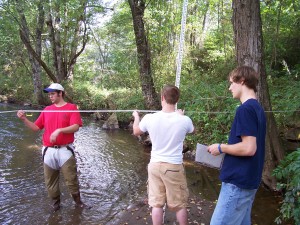
Introduction to Environmental Science students measure characteristics of Cullowhee Creek’s stream channel. Photo by Laura DeWald.
Although the program helps students to pursue creative careers, students stress the importance of knowing what you want to do after graduation in order to make the most out of your time at WCU.
“I would like for an internship be required to graduate,” said Floyd. “As a transfer student I didn’t have as much time to decide what my concentration would be and as a result I haven’t done any internships which I’m worried might hurt me when I’m trying to find a job after I graduate.”
“You must know what you want to do after graduation,” said Seychelles. “Employers are looking for a specific focus. Make sure your classes correspond with what you want to do later on before using your electives.”
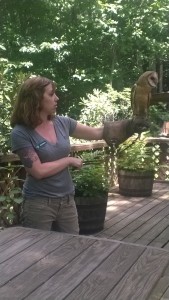
Environmental science student Ashlea Lindsey interns for Balsam Mountain Preserve’s Nature Center. Photo by Laura DeWald
Some of the courses taken by environmental science students help them learn to deal with real-world issues and figure out how to solve them.
“Environmental science majors are really good at solving complex problems, said DeWald. “A lot of them can market their capstone projects.”
The capstone is an annual sustainability project that connects the natural and built worlds, according to DeWald. The project deals with a real issue and a real client, such as WCU. In 2014, the capstone project dealt with the sustainability of the campus CatTran service. We have a transportation director now due to the information collected during this project, according to DeWald.
Floyd and Eddings both say that their biggest challenge in the program has been the capstone project.
“In some cases you have to use all of your skills from other classes and teachers. This can require you to go back and re-educate yourself on the methods used and do further research to get the answer,” said Floyd.
“We are creating a Sustainability Audit for Highlands Biological Station,” said Eddings. “This is such a large project that it is taking the entire class all semester. In the end we will present to the director of HBS some methods for them to become more sustainable and closer to being carbon neutral.”
Outside of their flexible, interdisciplinary curriculums, environmental science students are finding it difficult to create an identity for themselves as a major. According to DeWald, the most challenging part of the program has been creating a sense of community for environmental science students.
“A lot of people on campus don’t know what the environmental science program is,” said DeWald. “There isn’t a door that has the words ‘environmental science’ on it. We’re like this invisible presence on campus.”
According to DeWald, the program lacks resources. More faculty, time and space could help make the program more well-known on campus.
“Because it’s interdisciplinary, it’s hard to argue for more resources,” said DeWald.
The environmental science program is one of eight programs labeled as “truly exceptional and high performing,” according to the 20/20 Vision. These eight programs will be prioritized to receive any new resources that come to WCU, but that doesn’t necessarily mean that the environmental science program will gain any additional resources.
Some students have formed a sense of community through organizations such as the Eco Campus Awareness Team of Sustainability (Eco C.A.T.S.). Eco C.A.T.S. is a project-based sustainability club on campus run by Lauren Bishop, the chief sustainability officer and director of sustainability and energy management. The club is open to any student who wants to make a positive impact on WCU’s environment.
“We didn’t want to create an environmental science club, because to solve an environmental problem, you need everyone, not just [environmental science] majors,” said DeWald.
According to DeWald, the environmental science program is extremely limited by resources such as time, space and faculty. In the future, DeWald would like to see more faculty dedicated to the environmental science program and better recognition for faculty who currently participate in the program.
One improvement students would like to see is more trips and programs with professionals in their field.
“In one of my classes we took a field trip and met with professional scientists in multiple disciplines,” said Seychelles. “That was helpful. They talked about what they did and it helps students to have some connections.”
“I wish that there was more information and hands on experience, such as educational field trips, to areas that are being affected by the topics taught about in class,” said Turnbull.
